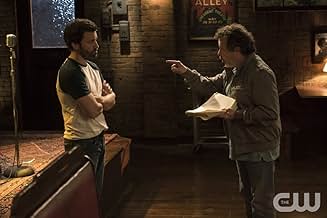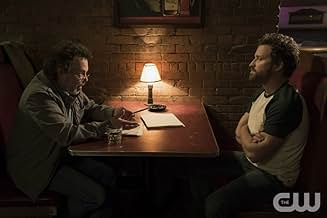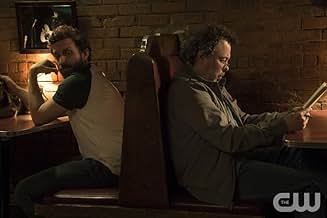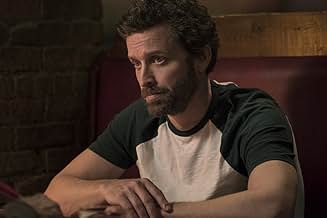Don't Call Me Shurley
- Episode aired May 4, 2016
- TV-14
- 42m
IMDb RATING
9.4/10
7.1K
YOUR RATING
Amara unleashes a dark fog on a small town that causes everyone to go mad. Dean and Sam realize this is a stronger version of the original black vein virus Amara previously unleashed.Amara unleashes a dark fog on a small town that causes everyone to go mad. Dean and Sam realize this is a stronger version of the original black vein virus Amara previously unleashed.Amara unleashes a dark fog on a small town that causes everyone to go mad. Dean and Sam realize this is a stronger version of the original black vein virus Amara previously unleashed.
Featured reviews
This episode was EXCELLENT.
We've waited 6 years to know the truth. And man, this is what most of us hoped and wanted.
For all the haters out there:
You CANNOT judge what happened based on your religion. God is beyond religions and fundamentalism. God created us in his own image so as Joan Osborne said: What if God was one of us?
This show showed us an alternative outlook of God and I personally LOVED it.
Kudos to the creators. The show is in its 11th season and still giving us GREAT stories and episodes.
We've waited 6 years to know the truth. And man, this is what most of us hoped and wanted.
For all the haters out there:
You CANNOT judge what happened based on your religion. God is beyond religions and fundamentalism. God created us in his own image so as Joan Osborne said: What if God was one of us?
This show showed us an alternative outlook of God and I personally LOVED it.
Kudos to the creators. The show is in its 11th season and still giving us GREAT stories and episodes.
Here I was, getting ho-hummed by the previous episodes of one of my favorite shows. Then came "Don't Call Me Shurly". I was....words can't describe...amazed!!!! (for the lack of a better one) The writers have outdone themselves on this one. Questions were answered, or were beginning to be answered that I have thought of not only through the show, but by myself through the years. Well, in a way only Supernatural can answer them. If this keeps up, I will have to buy this and any future episode that deals with this theme.
This is THE BEST episode I have seen yet! I have favorite episodes and entire seasons, but this one is truly awesome! I am looking forward to watching every week more than I ever have. Good work writers, staff and actors!!!!!! A MUST SEE. I am going to watch it again, and possible a few more times. That's how good it is!
This is THE BEST episode I have seen yet! I have favorite episodes and entire seasons, but this one is truly awesome! I am looking forward to watching every week more than I ever have. Good work writers, staff and actors!!!!!! A MUST SEE. I am going to watch it again, and possible a few more times. That's how good it is!
"Don't Call Me Shurley," the twentieth episode of Supernatural's eleventh season, directed by Robert Singer and penned by Robbie Thompson, is widely celebrated as one of the series' most daring and emotionally resonant hours. The episode is a watershed moment in Supernatural's mythology, finally confirming the long-suspected identity of Chuck Shurley as God and using this revelation to explore themes of creation, abandonment, and the nature of storytelling itself. By focusing largely on the philosophical and emotional dialogue between Chuck and Metatron, the episode delivers a chamber-piece drama that is as profound as it is entertaining, while the parallel plot involving Sam and Dean serves as a stark reminder of the apocalyptic stakes at play.
The episode opens with Metatron, now a fallen and destitute human, scavenging for food and sharing scraps with a stray dog-a striking image that underscores his fall from grace. He is suddenly transported to a mysterious bar by Chuck, who reveals himself with a wry smile and requests Metatron's help editing his memoir. This deceptively simple setup quickly unfolds into a layered conversation about God's motivations, regrets, and the meaning of his absence from the world. The script cleverly draws on the show's history, referencing Chuck's earlier appearances and the fan theories that have swirled since his disappearance at the end of season five. The dialogue between Chuck and Metatron is both combative and collaborative, with Metatron challenging Chuck's self-pity and indifference, ultimately forcing him to confront the consequences of his actions and inactions.
Rob Benedict delivers a standout performance as Chuck, imbuing the character with a blend of wit, weariness, and vulnerability. His portrayal of God as an author-one who delights in creation but is also burdened by the pain it causes-adds a meta-textual layer to the episode, inviting viewers to reflect on the nature of storytelling itself. Curtis Armstrong's Metatron, long one of the show's most reviled antagonists, is given new depth and humanity here. His impassioned defense of humanity, urging Chuck not to give up on his creation, is one of the episode's emotional high points and marks a turning point for the character, who moves from self-serving scribe to unlikely advocate for the world he once tried to control.
Parallel to this metaphysical debate, Sam and Dean investigate a murder-suicide in a small town, only to discover that Amara's fog is spreading, infecting the townspeople and stripping them of their souls. The horror escalates as the brothers and a handful of survivors barricade themselves in the police station, desperately trying to ward off the fog with tape and salt. The tension is palpable, especially as Sam succumbs to the infection and Dean is forced to watch helplessly as those around him fall. The sense of powerlessness is heightened by the episode's direction, which uses claustrophobic shots and a muted color palette to evoke a sense of impending doom.
The episode's structure is particularly effective, with the Chuck-Metatron storyline dominating the runtime and the Winchesters' struggle serving as a grim counterpoint. This balance allows the episode to explore both the cosmic and the personal stakes of the season's conflict. The writing is sharp, with moments of humor-such as Chuck's complaints about bad reviews and his offhand reference to "Bugs," the series' most maligned episode-offsetting the weightier philosophical discussions. The pacing is deliberate, giving space for the emotional beats to land without sacrificing momentum.
Visually, "Don't Call Me Shurley" is understated but evocative. The bar where Chuck and Metatron converse is bathed in warm, golden light, contrasting with the cold, sterile environment of the police station. The use of music is particularly noteworthy, especially in the final montage set to Chuck's rendition of "Fare Thee Well." As Chuck restores the town, resurrects the dead, and returns the glowing amulet to Dean, the sequence achieves a sense of awe and catharsis that few episodes in the series have matched.
One of the episode's boldest choices is its willingness to interrogate the character of God. Chuck is not portrayed as an infallible or omnibenevolent figure; instead, he is depicted as flawed, petulant, and even cowardly at times. His abandonment of creation is framed as both a personal failing and a narrative necessity, and the episode does not shy away from questioning whether such a being deserves forgiveness. This complexity is mirrored in Metatron's arc, as he moves from sycophant to critic to, ultimately, a kind of redeemer-at least in the eyes of the audience.
While the Winchesters' subplot is less central, it serves an important function in illustrating the stakes of Chuck's decisions. The fog's inexorable advance, the mounting body count, and Sam's infection all underscore the urgency of divine intervention. Some critics have argued that the resolution-a literal deus ex machina, with Chuck reversing the destruction at the last moment-feels a bit too convenient. However, others have noted that this choice is thematically appropriate, highlighting both the limitations of the protagonists and the overwhelming power of the adversary they face.
In the broader context of television and genre storytelling, "Don't Call Me Shurley" stands as a meditation on the relationship between creator and creation, faith and doubt, and the enduring power of narrative. The episode's willingness to break from formula, foreground philosophical debate, and deliver long-awaited answers to series-spanning mysteries marks it as a high point not only for Supernatural, but for genre television as a whole. Its blend of humor, pathos, and theological inquiry invites viewers to reflect on the stories we tell and the gods we create-both on screen and in our own lives.
In conclusion, "Don't Call Me Shurley" is a masterful episode that balances mythological revelation, character development, and existential inquiry. Through its standout performances, thoughtful writing, and emotionally charged direction, it elevates Supernatural's eleventh season and leaves a lasting impact on the series' legacy. By finally bringing God into the narrative and forcing both characters and viewers to confront the implications of his presence, the episode redefines the stakes of the show and sets the stage for an epic confrontation with the Darkness. It is an episode that lingers in the mind, not just for what it reveals, but for the questions it dares to ask.
The episode opens with Metatron, now a fallen and destitute human, scavenging for food and sharing scraps with a stray dog-a striking image that underscores his fall from grace. He is suddenly transported to a mysterious bar by Chuck, who reveals himself with a wry smile and requests Metatron's help editing his memoir. This deceptively simple setup quickly unfolds into a layered conversation about God's motivations, regrets, and the meaning of his absence from the world. The script cleverly draws on the show's history, referencing Chuck's earlier appearances and the fan theories that have swirled since his disappearance at the end of season five. The dialogue between Chuck and Metatron is both combative and collaborative, with Metatron challenging Chuck's self-pity and indifference, ultimately forcing him to confront the consequences of his actions and inactions.
Rob Benedict delivers a standout performance as Chuck, imbuing the character with a blend of wit, weariness, and vulnerability. His portrayal of God as an author-one who delights in creation but is also burdened by the pain it causes-adds a meta-textual layer to the episode, inviting viewers to reflect on the nature of storytelling itself. Curtis Armstrong's Metatron, long one of the show's most reviled antagonists, is given new depth and humanity here. His impassioned defense of humanity, urging Chuck not to give up on his creation, is one of the episode's emotional high points and marks a turning point for the character, who moves from self-serving scribe to unlikely advocate for the world he once tried to control.
Parallel to this metaphysical debate, Sam and Dean investigate a murder-suicide in a small town, only to discover that Amara's fog is spreading, infecting the townspeople and stripping them of their souls. The horror escalates as the brothers and a handful of survivors barricade themselves in the police station, desperately trying to ward off the fog with tape and salt. The tension is palpable, especially as Sam succumbs to the infection and Dean is forced to watch helplessly as those around him fall. The sense of powerlessness is heightened by the episode's direction, which uses claustrophobic shots and a muted color palette to evoke a sense of impending doom.
The episode's structure is particularly effective, with the Chuck-Metatron storyline dominating the runtime and the Winchesters' struggle serving as a grim counterpoint. This balance allows the episode to explore both the cosmic and the personal stakes of the season's conflict. The writing is sharp, with moments of humor-such as Chuck's complaints about bad reviews and his offhand reference to "Bugs," the series' most maligned episode-offsetting the weightier philosophical discussions. The pacing is deliberate, giving space for the emotional beats to land without sacrificing momentum.
Visually, "Don't Call Me Shurley" is understated but evocative. The bar where Chuck and Metatron converse is bathed in warm, golden light, contrasting with the cold, sterile environment of the police station. The use of music is particularly noteworthy, especially in the final montage set to Chuck's rendition of "Fare Thee Well." As Chuck restores the town, resurrects the dead, and returns the glowing amulet to Dean, the sequence achieves a sense of awe and catharsis that few episodes in the series have matched.
One of the episode's boldest choices is its willingness to interrogate the character of God. Chuck is not portrayed as an infallible or omnibenevolent figure; instead, he is depicted as flawed, petulant, and even cowardly at times. His abandonment of creation is framed as both a personal failing and a narrative necessity, and the episode does not shy away from questioning whether such a being deserves forgiveness. This complexity is mirrored in Metatron's arc, as he moves from sycophant to critic to, ultimately, a kind of redeemer-at least in the eyes of the audience.
While the Winchesters' subplot is less central, it serves an important function in illustrating the stakes of Chuck's decisions. The fog's inexorable advance, the mounting body count, and Sam's infection all underscore the urgency of divine intervention. Some critics have argued that the resolution-a literal deus ex machina, with Chuck reversing the destruction at the last moment-feels a bit too convenient. However, others have noted that this choice is thematically appropriate, highlighting both the limitations of the protagonists and the overwhelming power of the adversary they face.
In the broader context of television and genre storytelling, "Don't Call Me Shurley" stands as a meditation on the relationship between creator and creation, faith and doubt, and the enduring power of narrative. The episode's willingness to break from formula, foreground philosophical debate, and deliver long-awaited answers to series-spanning mysteries marks it as a high point not only for Supernatural, but for genre television as a whole. Its blend of humor, pathos, and theological inquiry invites viewers to reflect on the stories we tell and the gods we create-both on screen and in our own lives.
In conclusion, "Don't Call Me Shurley" is a masterful episode that balances mythological revelation, character development, and existential inquiry. Through its standout performances, thoughtful writing, and emotionally charged direction, it elevates Supernatural's eleventh season and leaves a lasting impact on the series' legacy. By finally bringing God into the narrative and forcing both characters and viewers to confront the implications of his presence, the episode redefines the stakes of the show and sets the stage for an epic confrontation with the Darkness. It is an episode that lingers in the mind, not just for what it reveals, but for the questions it dares to ask.
I cannot say why I love this episode. Really. It somehow hit me, even made me cry.
I agree with people here - you will either love this episode or not. You will either find this episode's dialog between G-d and Metatron amazing,or trivial.
I agree with people here - you will either love this episode or not. You will either find this episode's dialog between G-d and Metatron amazing,or trivial.
no spoilers here...
just when i thought they were never going to pull this card out of the supernatural deck... NO YOU DINT GUYS! yes you did! i loved it. fearless.
not the tightest episode by far in terms of storytelling, but a very enjoyable turn/reveal in terms of the overall story arc. and i'm still diggin' metatron very much.
i've felt they were stalling out on the amara storyline and think this episode hearkens a needed plot re-energization and hopefully they will punch it into higher gear the rest of the season.
just when i thought they were never going to pull this card out of the supernatural deck... NO YOU DINT GUYS! yes you did! i loved it. fearless.
not the tightest episode by far in terms of storytelling, but a very enjoyable turn/reveal in terms of the overall story arc. and i'm still diggin' metatron very much.
i've felt they were stalling out on the amara storyline and think this episode hearkens a needed plot re-energization and hopefully they will punch it into higher gear the rest of the season.
Did you know
- TriviaWhile talking to Metatron, Chuck say he was busy writing another book-series: Revolution. Revolution was a TV-Show written by Eric Kripke, who was also the creator/writer of Supernatural.
- GoofsThe pages that Metatron are reading from are clearly blank.
- Quotes
Sam Winchester: [to Dean] Dude, quit ironing my shirts with beer.
- ConnectionsFeatured in WatchMojo: Top 30 Best TV Plot Twists You Didn't See Coming (2024)
Details
Contribute to this page
Suggest an edit or add missing content






















